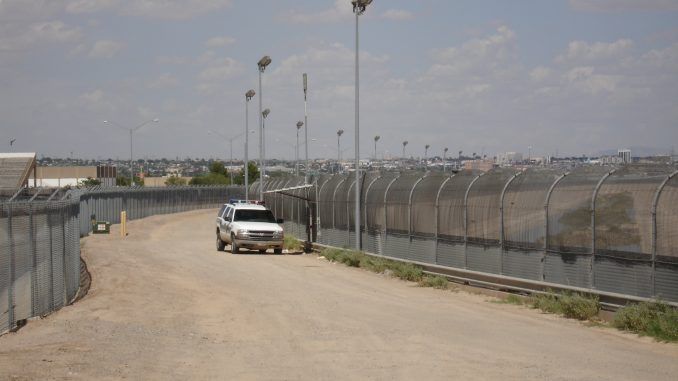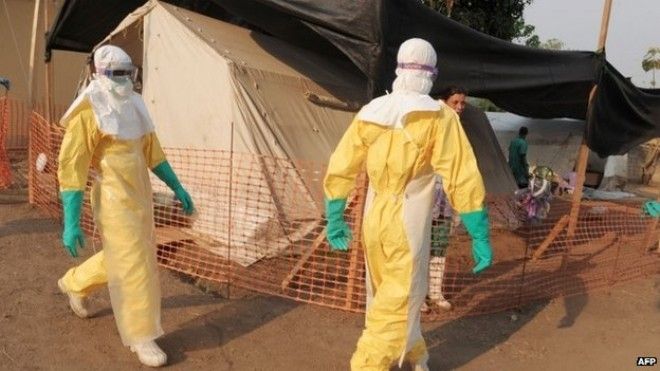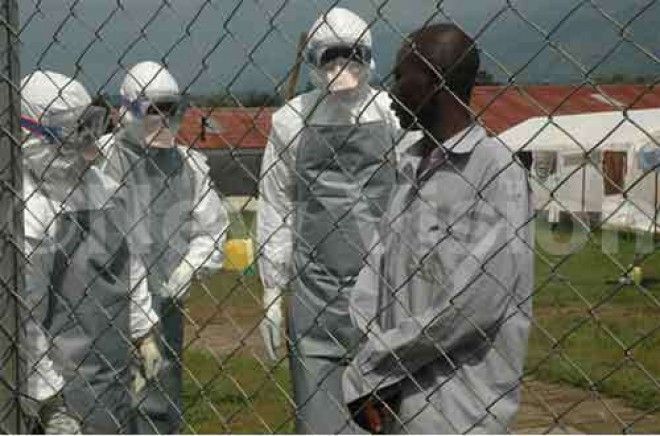
With the news released today that Kenya is closing it’s borders to travelers from Ebola states (link), people across the globe are beginning to wonder what is really going on with the Ebola crisis. First of all, Kenya is not the first country to close it’s borders and it certainly will not be the last. So far, Nigeria, Sierra Leone, Guinea, and Liberia are among the countries that have banned travelers from entering their countries from infected countries.
However, there is a bigger question looming: will the United States, the United Kingdom and other western countries begin to ban travelers from not only entering the country, but citizens of these countries from leaving? It sounds like a story made for a Hollywood film, but how close is this to being a reality? First of all, to understand the situation, let’s take a look at the facts of the ongoing Ebola crisis.

BYPASS THE CENSORS
Sign up to get unfiltered news delivered straight to your inbox.
You can unsubscribe any time. By subscribing you agree to our Terms of Use
According to The Center For Disease Control (the CDC: link), so far: “(The) CDC is rapidly increasing its ongoing efforts to curb the expanding West African Ebola outbreak and deploying staff to four African nations currently affected: Guinea, Sierra Leone, Liberia, and Nigeria.”
“This is the largest Ebola outbreak in history and the first in West Africa. The outbreak in West Africa is worsening, but CDC, along with other U.S. government agencies and international partners, is taking active steps to respond to this rapidly changing situation.”
“CDC elevated its Emergency Operations Center (EOC) to a Level 1 activation, its highest level, because of the significance of the outbreak in West Africa. CDC is surging our response with the current challenges that we are facing. CDC is sending additional CDC disease control specialists into the four countries.”
A report posted on CNN.com gives us a general timeline of the current 2014 outbreak:
2014 Outbreak: Confirmed or suspected cases of Ebola as of August 13, 2014 (World Health Organization):
Guinea – 519 cases, 380 deaths
Liberia – 786 cases, 413 deaths
Nigeria – 12 cases, 4 deaths
Sierra Leone – 810 cases, 348 deaths
March 25, 2014 – The CDC issues its initial announcement on an outbreak in Guinea, and reports of cases in Liberia and Sierra Leone. “In Guinea, a total of 86 suspected cases, including 59 deaths (case fatality ratio: 68.5%), had been reported as of March 24, 2014. Preliminary results from the Pasteur Institute in Lyon, France suggest Zaire ebolavirus as the causative agent.”
April 16, 2014 – The New England Journal of Medicine publishes a report, speculating that the current outbreak’s Patient Zero was a two-year-old from Guinea. The child died on December 6, 2013, followed by his mother, sister and grandmother over the next month.
July 2014 – Patrick Sawyer, a top government official in the Liberian Ministry of Finance, dies at a local Nigerian hospital. He is the first American to die in what officials are calling “deadliest Ebola outbreak in history.”
July 2014 – Nancy Writebol, an American aid worker in Liberia, tests positive for Ebola. According to Samaritan’s Purse, Writebol is infected while treating Ebola patients in Liberia.
July 26, 2014 – Kent Brantly, medical director for Samaritan Purse’s Ebola Consolidated Case Management Center in Liberia, is infected with the virus. According to Samaritan’s Purse, Brantly is infected while treating Ebola patients.
July 29, 2014 – According to Doctors Without Borders, Dr. Sheik Humarr Khan who was overseeing Ebola treatment at Kenema Government Hospital in Sierra Leone dies from complications of the disease.
July 30, 2014 – The Peace Corps announces it is removing its volunteers from Liberia, Sierra Leone and Guinea.
July 31, 2014 – CDC raises its warning to Level 3. It warns U.S. residents to avoid “nonessential travel” to Sierra Leone, Guinea, and Liberia.
August 2, 2014 – A specially equipped medical plane carrying Ebola patient Dr. Kent Brantly lands at Dobbins Air Reserve Base in Marietta, Georgia. He is then driven by ambulance to Emory University Hospital in Atlanta.
August 4, 2014 – CNN reports that three top secret, experimental vials of the drug, “ZMapp,” were flown into Liberia last week in a last-ditch effort to save Brantly and Writebol, according to a source familiar with details of the treatment. Doctors report “significant improvement.”
August 6, 2014 – Nancy Writebol arrives at Emory in Atlanta for treatment.
August 8, 2014 – Experts at the World Health Organization declare the Ebola epidemic ravaging West Africa an international health emergency that requires a coordinated global approach, describing it as the worst outbreak in the four-decade history of tracking the disease.
So far, we know that this is the worst outbreak of Ebola in recorded human history. Ebola is a deadly virus that, according to multiple health agencies, “Once the virus enters the body, it targets several types of immune cells that represent the first line of defense against invasion. It infects dendritic cells, which normally display signals of an infection on their surfaces to activate T lymphocytes—the white blood cells that could destroy other infected cells before the virus replicates further. With defective dendritic cells failing to give the right signal, the T cells don’t respond to infection, and neither do the antibodies that depend on them for activation. The virus can start replicating immediately and very quickly.
Ebola, like many viruses, works in part by inhibiting interferon—a type of molecule that cells use to hinder further viral reproduction. In a new study published today in Cell Host & Microbe, researchers found that one of Ebola’s proteins, called VP24, binds to and blocks a transport protein on the surface of immune cells that plays an important role in the interferon pathway.
Curiously, lymphocytes themselves don’t become infected with the virus, but a series of other factors—a lack of stimulation from some cells and toxic signals from others—prevent these primary immune cells from putting up a fight.
As the virus travels in the blood to new sites, other immune cells called macrophages eat it up. Once infected, they release proteins that trigger coagulation, forming small clots throughout the blood vessels and reducing blood supply to organs. They also produce other inflammatory signaling proteins and nitric oxide, which damage the lining of blood vessels, causing them to leak. Although this damage is one of the main symptoms of infection, not all patients exhibit external hemorrhaging—bleeding from the eyes, nose, or other orifices.”
You can find pretty horrifying reports like this across the internet and various media sources on repeat. But, what is even more interesting is what is happening behind the scenes. Now that we know a sampling of the “official facts”, let’s look at the further implications that this virus is causing. You see, as with many epidemics, there often becomes a new path to push legislation through that otherwise would die.
Let’s start with Rep. Alan Grayson, D-Fla., who requested on July 30th, 2014 in a letter to Department of Homeland Security Secretary Jeh Johnson and Secretary of State John Kerry that the American borders be closed to the countries infected with Ebola. Now, on the outside, this seems like a pretty harmless request. Ask for “border protection” so that the virus doesn’t hit the United States. The problem? Well, there are two verified people who have been (for the first time in history) flown to the United States to be treated. This, coupled with the dozens of other Americans who are currently being tested for the virus should raise a red flag for those in western countries.
Why? Well, for starters, Grayson isn’t the only one asking for the United States borders to be shut down. In an article on PolitiFact.com entitled, “Rep. Phil Gingrey says migrants may be bringing Ebola virus through the U.S.-Mexico border”. Now, isn’t that odd? Another United States representative in the government asking for border control due to Ebola… from Mexico?
Mexico is thousands of miles from the affected areas, yet Rep. Gingrey writes in his open letter, “‘As you know, the United States is currently experiencing a crisis at our southern border. The influx of families and unaccompanied children at the border poses many risks, including grave public health threats.
‘As a physician for over 30 years, I am well aware of the dangers infectious diseases pose. In fact, infectious diseases remain in the top 10 causes of death in the United States. … Reports of illegal migrants carrying deadly diseases such as swine flu, dengue fever, Ebola virus and tuberculosis are particularly concerning.‘”
Back to Rep. Grayson, who, in his open letter states, “‘I urge you to consider the enhanced danger Ebola now presents to the American public, and therefore request that appropriate travel restrictions be implemented immediately.’”
So, why should we care? It’s just some US politicians asking for the protection of it’s citizens, right? Well, yes…no… maybe? Here’s the thing. There have been whispers for years of the American borders not just being closed to illegal immigrants, but also to United States Citizens. In other words – if you live in the US and you don’t like what’s happening, there is no way out.
The Politifact article goes on to say, “‘The border patrol gave us a list of the diseases that they’re concerned about, and Ebola was one of those,’ Gingrey told Russert. ‘I can’t tell you specifically that there were any cases of Ebola, I don’t think there were, but of course tuberculosis, Chagas disease, many – smallpox, some of the infectious diseases of children, all of these are concerns.’
So is there anything to the Ebola claim?
Experts we asked issued a resounding ‘No.'”
Which brings us back to our original point: what does this drumbeat that the United States is slowly starting really mean for citizens of Western countries? According to NPR, United States citizens are abandoning their citizenship in record numbers. With the United States’ police forces becoming more and more militarized, as evidenced in the recent Ferguson, MO incident, people want out. The problem? Government loses control when people abandon their own country.
Slowly, we are being introduced to the idea of “closing borders” from “one side” (coming IN to the country), but what is missing from these reports is the truth that this can very, very easily lead to not allowing American citizens to leave their own country if they feel fit. Just this past week, a Princeton University study said that the United States is no longer an actual democracy (link here). This should have raised not only anger, but movement in the American people to ask why… yet, it has not.
The Ebola Virus scare may mean a thousand things to a thousand different people, however, we in the west must be aware that our borders being shut down isn’t a one way street. We could very well be the prisoners in our own country, and really, who wants that?
Sources:
http://www.usnews.com/news/articles/2014/07/30/congressman-close-border-to-ebola-countries
http://www.bbc.com/news/world-africa-28823247
http://uk.reuters.com/article/2014/06/11/us-health-ebola-leone-idUKKBN0EM2CG20140611
https://thepeoplesvoice.tv/princeton-study-u-s-no-longer-an-actual-democracy/
Latest posts by Royce Christyn (see all)
- Irish Slaves – What The History Books Will Never Tell You - November 1, 2017
- Government Op Who Predicted Super Bowl Score Warns Of Nuclear War - February 18, 2017
- Video: Why Voting Doesn’t Change Anything & Democracy Is A Lie - May 7, 2016





thank you so much for this awful website me and my class precious this satisfied and insight
thank you so much for this impressive internet site me and my household preferent this satisfied and penetration
thank you so much for this awesome site me and my class admired this depicted object and sixth sense